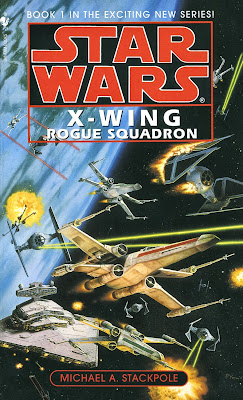 |
| Brotherly love. |
Kharn is interesting, or rather, Kharn is a fundamentally uninteresting character handled in an interesting way here. As I've said, 'After Desh'ea' is one of my favourite HH short stories, partially because we see Kharn as he used to be: noble, capable, and in control of himself. In 'Betrayer', that Kharn is long gone. Glimpses of him remain, but his personality is quite comprehensively shattered by the constant pain in his skull, and any tactical nous he begins to display is generally dashed quite quickly. I can't pretend that I find much interest in a character who is constantly howling for blood and running towards the enemy, but luckily Dembski-Bowden is too good a writer to make him into a cardboard cut-out like the 41st Millennium Kharn pretty much is. The interesting moments come from the times where Kharn fights against the slow lobotomy taking place inside him and shows sparks of his old nature, even defying Angron a few times.
Even in the full grip of the Nails, Kharn is given a few moments to ponder on the nature of the Legion and the Primarch without it seeming shoved-in and clumsy. His gallows humour is also welcome. Apart from Kharn, though, the most interesting characters are the naysayers to Angron's path. Sure, all the World Eaters know deep down their Primarch is a broken, unworthy thing, but Esca (a doomed Librarian) and Lhorke (a Dreadnought entombed long before Angron joined the Legion) are much more... direct in their disapproval. It's a bit of a shame we couldn't spend more time with them.
Dembski-Bowden also seizes the opportunity to build on his characterisation of Lorgar here. His scenes really are priceless, and all the more effective when his quiet self-confidence and capable intellect are juxtaposed with Angron's twitching, snarling rages. These two really, really have an odd dynamic to their relationship: competitive, suspicious, but somehow affectionate... well, brotherly. (Oh, and speaking of the Urizen: there are juicy hints that follow on from what (I think) was implied in Abnett's divisive 'Pariah': Lorgar is the originator of Enuncia, or at least he's the one who's brought it into the 31st milennium.) Additionally, we get to see more of Argel Tal, who is... different from the last time we saw him. He seems more comfortable with his possessed state, but he is also haunted by the events near the end of 'The First Heretic'. He and Kharn have an oddly touching friendship. They are probably two of the most noble soldiers in the Traitor Legions we've spent time with thus far. Quite an accomplishment considering the atrocities they're responsible for... To this, add even more exploration of the split within the Word Bearers (Lorgar grows ever more tired of Erebus and Kor Phaeron's frolicking about) and their fallout for Argel Tal, and it's fair to say this is about the 17th Legion just as much as it is the 12th.
 |
| If you're expecting 350 pages of the above, you're shit outta luck. |
Void war, on the other hand, is something else. I grew up loving Star Wars and devouring whichever of the spin-off novels I could find in my local library. The colossal space battles, and the incredibly diverse ship types darting through the action, were one of the main reasons it made such an impact on me. I can't say I'm a Star Wars fan still. (Maybe it was Episode III. Maybe it was slowly realising how fucking racist George Lucas is. Maybe it was something else.) But that shit has stayed with me. It's clear to me Dembski-Bowden shares that aspect of Star Wars space-battle love. Maybe he's a Rogue Squadron fan too? Whatever the case, the celestial slugfests of 'Betrayer' are superb - perhaps even better than the ones in his Night Lords books, which is really saying something. They're edge-of-the-seat tense, they drive the plot forward, and they're also very, very readable; not dumbed-down, but also not getting lost in dreary litanies of tech-specs. And yeah, I'd say this is an area where AD-B is (whisper it) Better Than Abnett. SHIT!!! I've said it, and I can't take it back.
 |
| While I wouldn't call it "good" as such, I'm still fond of this series. |
What's the last word on 'Betrayer'? I'll be honest. I didn't love this book to start with, or at least, I didn't love it as much as I wanted to. After the last two novels in HH being so brilliant - pardon me, masters McNeill and Swallow, for saying unexpectedly brilliant - I was fiendin' for the newest AD-B masterwork. For the first hundred or so pages... I couldn't get into it. There is a lot of throat-clearing and character development, and sometimes you'll think "Get to the interesting stuff!" But hell, when the plot really starts moving, you'll forget all about any initial misgivings and get into the bloody, twisty and (unexpectedly) heart-wrenching story. Perhaps I'm a gay nerd, but I swear I had actual tears in my eyes when Angron tripped down memory lane and poured a 40 of blood for his dead homies. And by the time 'Betrayer' ended, I honestly felt emotionally scarred... And for that, I give it 9/10. I can't wait for the saga of Lorgar to continue.
New to PurpleHeresy? Head on over to the index page to see a more chronological list of the Horus Heresy reviews on this blog.
No comments:
Post a Comment